虚拟式句型转换(1)
高中必备知识点解析虚拟语气的形式与用法

高中必备知识点解析虚拟语气的形式与用法虚拟语气是高中英语必备的语法知识点之一。
它在英语中经常被用于表达假设、愿望、建议、命令和推测等情态,通过使用虚拟语气,可以使语言更加丰富和准确。
本文将深入解析虚拟语气的形式与用法。
一、虚拟语气的形式1. 虚拟语气的一般现在时:用于表示与现在事实相反的情况。
其结构为:主语+动词原形(倒装)。
例如:If I were you, I would study harder.(如果我是你,我会更加努力学习。
)2. 虚拟语气的一般过去时:用于表示与过去事实相反的情况。
其结构为:主语+动词过去式(倒装)。
例如:If I had seen her yesterday, I would have said hello.(如果我昨天见到她,我会问好的。
)3. 虚拟语气的过去完成时:用于表示对过去情况的猜测或不可能发生的情况。
其结构为:主语+动词过去完成式(倒装)。
例如:I wish I had studied harder for the exam.(我希望我为考试努力学习。
)二、虚拟语气的用法1. 表达假设与条件:If I were you, I would travel around the world.(如果我是你,我会环游世界。
)I wish I had a million dollars.(我希望我有一百万美元。
)2. 表达愿望与建议:I wish you would stop smoking.(我希望你戒烟。
)It's important that she arrive on time.(她按时到达很重要。
)3. 表达命令与要求:The teacher ordered that the students be quiet.(老师要求学生们保持安静。
)She insisted that he leave immediately.(她坚持要他立刻离开。
)4. 表达推测与猜测:He looks as if he were sick.(他看起来像是生病了。
英语虚拟式的用法
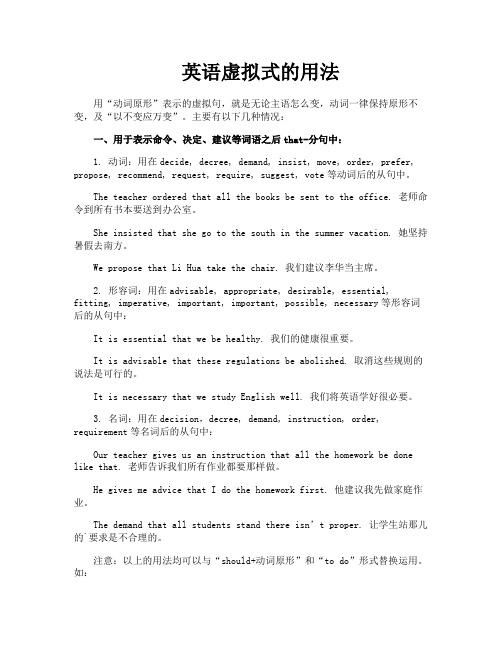
英语虚拟式的用法用“动词原形”表示的虚拟句,就是无论主语怎么变,动词一律保持原形不变,及“以不变应万变”。
主要有以下几种情况:一、用于表示命令、决定、建议等词语之后that-分句中:1. 动词:用在decide, decree, demand, insist, move, order, prefer, propose, recommend, request, require, suggest, vote等动词后的从句中。
The teacher ordered that all the books be sent to the office. 老师命令到所有书本要送到办公室。
She insisted that she go to the south in the summer vacation. 她坚持暑假去南方。
We propose that Li Hua take the chair. 我们建议李华当主席。
2. 形容词:用在advisable, appropriate, desirable, essential, fitting, imperative, important, important, possible, necessary等形容词后的从句中:It is essential that we be healthy. 我们的健康很重要。
It is advisable that these regulations be abolished. 取消这些规则的说法是可行的。
It is necessary that we study English well. 我们将英语学好很必要。
3. 名词:用在decision,decree, demand, instruction, order, requirement等名词后的从句中:Our teacher gives us an instruction that all the homework be done like that. 老师告诉我们所有作业都要那样做。
虚拟语气在条件句中的特殊用法与句型转换
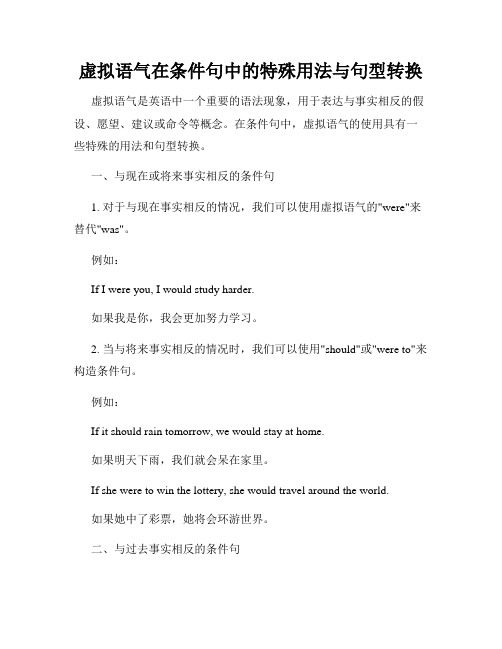
虚拟语气在条件句中的特殊用法与句型转换虚拟语气是英语中一个重要的语法现象,用于表达与事实相反的假设、愿望、建议或命令等概念。
在条件句中,虚拟语气的使用具有一些特殊的用法和句型转换。
一、与现在或将来事实相反的条件句1. 对于与现在事实相反的情况,我们可以使用虚拟语气的"were"来替代"was"。
例如:If I were you, I would study harder.如果我是你,我会更加努力学习。
2. 当与将来事实相反的情况时,我们可以使用"should"或"were to"来构造条件句。
例如:If it should rain tomorrow, we would stay at home.如果明天下雨,我们就会呆在家里。
If she were to win the lottery, she would travel around the world.如果她中了彩票,她将会环游世界。
二、与过去事实相反的条件句1. 当与过去事实相反的情况时,我们可以使用虚拟语气的"had"来替代"have"。
例如:If I had known the truth, I would have made a different decision.如果我早知道真相,我会做出不同的决定。
2. 当与过去事实相反的情况并且结果仍然存在时,我们可以使用"should have"或"were to"来构造条件句。
例如:If he should have arrived on time, we would have caught the train.如果他按时到达,我们就能赶上那班火车。
If she were to have gotten the promotion, she would have had a higher salary.如果她得到了晋升,她的薪水就会更高。
高考语法虚拟语气

高考语法虚拟语气虚拟语气在高考语法考试中占据很重要的位置。
虚拟语气是用来表示非真实的、不确定的、假设的情况,或表达愿望、建议、命令等的语气。
下面我将详细介绍虚拟语气的各种形式及其用法。
一、虚拟语气的情态动词虚拟语气通常由情态动词来表示,包括:1. should + 动词原形,可以表示建议或命令。
2. would + 动词原形,可以表示请求或愿望。
3. could + 动词原形,可以表示能力、请求或愿望。
4. might + 动词原形,可以表示可能性。
5. had + 过去分词,可以表示对过去情况的假设。
6. were + 动词原形,多用于第二和第三人称单数的句子中,表示假设或愿望。
二、虚拟语气的用法1. 虚拟条件句虚拟条件句常用在表示条件的从句中,表示与现在或将来事实相反的假设情况。
主句中常使用情态动词或“would”来表示假设的结果。
例句1:If I were a bird, I would fly in the sky.(假设的情况是我是一只鸟,结果是我会在天空中飞翔。
)例句2:If you had studied harder, you would have passed the exam.(假设的情况是你学习更努力了,结果是你已经通过考试了。
)2. 虚拟语气用于表达命令、建议、要求、要求等虚拟语气还常用于表达命令、建议、要求等。
在这种情况下,常用“should + 动词原形”或“would + 动词原形”。
例句3:You should help your parents with the housework.(你应该帮助你的父母做家务。
)例句4:I wish you would listen to me.(我希望你能听我说。
)3. 虚拟语气用于表达愿望虚拟语气还常用于表达愿望,其中“would”是常见的情态动词。
例句5:I wish I could play the piano.(我希望我能弹钢琴。
高中英语知识点归纳语法虚拟语气的使用与变化

高中英语知识点归纳语法虚拟语气的使用与变化英语知识点归纳:语法虚拟语气的使用与变化虚拟语气(Subjunctive Mood)是英语语法中的一种特殊形式,用来表示虚构、非事实或假设的情况。
本文将对英语中虚拟语气的使用和变化进行归纳。
一、虚拟语气的用途1. 表达愿望和建议:- I wish/If only + 过去式:表达对过去情况的遗憾和不满。
例如:I wish I had studied harder for the exam.(我希望我当时能更努力地学习。
)- Would rather (that) + 主语 + 过去式:表达对现在或将来情况的偏好。
例如:I would rather you came with us.(我宁愿你和我们一起去。
)- It's time (that) + 主语 + 过去式:表示现在是做某事的时候。
例如:It's time you went to bed.(现在是你上床睡觉的时候了。
)2. 表达虚构的情况:- If + 主语 + 过去式,主语 + would/could + 动词原形:表示与现在事实相反的假设情况。
例如:If I were you, I would apologize.(如果我是你,我会道歉。
)3. 表达建议、要求、命令等:- It is important/necessary/advisable/essential... + that + 主语 +(should)+ 动词原形:表示建议或要求。
例如:It is necessary that he (should) finish the task on time.(他必须按时完成任务。
)二、虚拟语气的变化形式1. 一般现在时和一般过去时:- 一般现在时变为虚拟语气时,动词be的过去式用were;- 一般过去时变为虚拟语气时,动词的过去式使用过去完成时的形式。
2. 现在进行时和过去进行时:- 现在进行时变为虚拟语气时,be动词的现在分词形式变为were。
语法小技巧虚拟语气的情态动词运用与替代
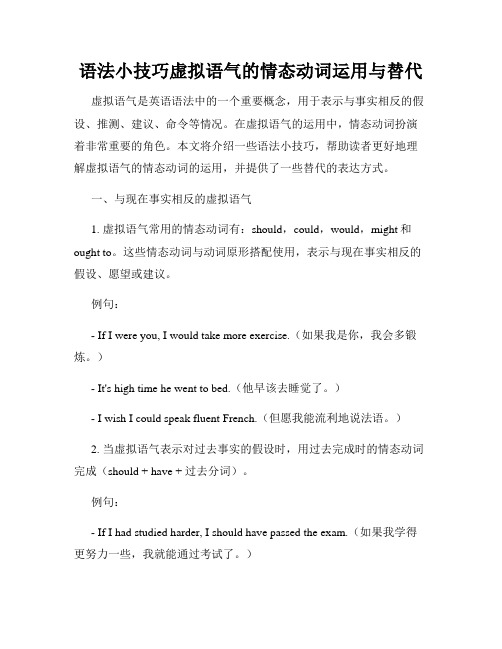
语法小技巧虚拟语气的情态动词运用与替代虚拟语气是英语语法中的一个重要概念,用于表示与事实相反的假设、推测、建议、命令等情况。
在虚拟语气的运用中,情态动词扮演着非常重要的角色。
本文将介绍一些语法小技巧,帮助读者更好地理解虚拟语气的情态动词的运用,并提供了一些替代的表达方式。
一、与现在事实相反的虚拟语气1. 虚拟语气常用的情态动词有:should,could,would,might和ought to。
这些情态动词与动词原形搭配使用,表示与现在事实相反的假设、愿望或建议。
例句:- If I were you, I would take more exercise.(如果我是你,我会多锻炼。
)- It's high time he went to bed.(他早该去睡觉了。
)- I wish I could speak fluent French.(但愿我能流利地说法语。
)2. 当虚拟语气表示对过去事实的假设时,用过去完成时的情态动词完成(should + have + 过去分词)。
例句:- If I had studied harder, I should have passed the exam.(如果我学得更努力一些,我就能通过考试了。
)3. 表示反对、否认或建议时,可以使用情态动词与主语连用,构成虚拟语气。
例句:- I'd rather you didn't smoke in the car.(我宁愿你不要在车里抽烟。
)- It's time you stopped making excuses.(你该停止找借口了。
)二、与过去事实相反的虚拟语气1. 在与过去事实相反的假设中,常用的情态动词有:should,could,would,might和ought to。
这些情态动词与动词的过去式搭配使用。
例句:- If I had known the truth, I would have acted differently.(如果我知道了真相,我会采取不同的行动。
虚拟语气的用法与句型

虚拟语气的用法与句型虚拟语气是指在句子中表达一种假设、愿望、建议、命令等非真实情况的语气。
它在表达的内容上与现实相悖,用于描述与实际情况相反或与现在事实相反的假想情况。
虚拟语气在汉语中分为虚拟条件和虚拟假设两种情况。
本文将详细介绍虚拟语气的用法和常见句型。
一、表示假设的虚拟条件句型1. 如果引导的条件句条件句使用“如果+主语+动词”的结构,表示与实际情况相反的假设。
举例:如果我会飞,我就飞到天空中。
如果你能去,我们就一起去旅行。
如果明天下雨,我就不去跑步了。
2. 要是引导的条件句条件句使用“要是+主语+动词”的结构,表示与实际情况相反的假设。
举例:要是你在这里,我就不会感到孤单。
要是他努力学习,他就可以考上大学。
要是明天放假,我就会去看电影。
3. 假如引导的条件句条件句使用“假如+主语+动词”的结构,表示与实际情况相反的假设。
举例:假如我是你,我就不会这样选择。
假如我有足够的时间,我就会旅行。
假如天气好,我们就可以去海边玩。
二、表示愿望的虚拟条件句型1. 祈使句+“但愿(希望)”句型使用祈使句来表达对未来情况的愿望,后接“但愿(希望)”引导的句子,表示非真实情况的愿望。
举例:多带雨伞,但愿今天不下雨。
早点回家,但愿家里没人。
努力学习,但愿能考好成绩。
2. 希望/愿望+“(能)+动词原形”使用希望或愿望来表达对未来情况的期望,后接能否+动词原形,表示非真实情况的愿望。
举例:我希望明天不下雨。
我希望他能来参加我的生日派对。
我希望你明天能早点到公司。
三、表达建议的虚拟条件句型1. 建议/要求/命令+“(应该)+动词原形”使用建议、要求或命令来表达对他人的建议,后接“应该”引导的句子,表示非真实情况的建议。
举例:你应该多锻炼身体,这样会更健康。
你应该早点睡觉,这样明天才能精神饱满。
上班迟到是不对的,你应该注意时间。
2. 要是/如果+动词过去式使用要是或如果来引导一个非真实情况的条件句,表示一种建议或建议的情感色彩。
虚拟语气的用法和常见句型
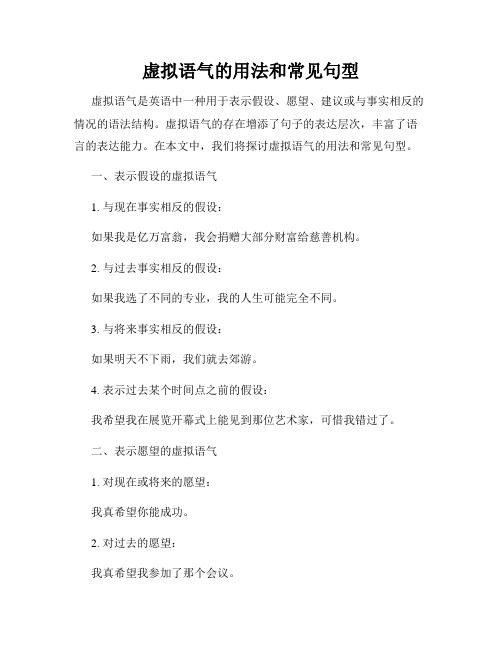
虚拟语气的用法和常见句型虚拟语气是英语中一种用于表示假设、愿望、建议或与事实相反的情况的语法结构。
虚拟语气的存在增添了句子的表达层次,丰富了语言的表达能力。
在本文中,我们将探讨虚拟语气的用法和常见句型。
一、表示假设的虚拟语气1. 与现在事实相反的假设:如果我是亿万富翁,我会捐赠大部分财富给慈善机构。
2. 与过去事实相反的假设:如果我选了不同的专业,我的人生可能完全不同。
3. 与将来事实相反的假设:如果明天不下雨,我们就去郊游。
4. 表示过去某个时间点之前的假设:我希望我在展览开幕式上能见到那位艺术家,可惜我错过了。
二、表示愿望的虚拟语气1. 对现在或将来的愿望:我真希望你能成功。
2. 对过去的愿望:我真希望我参加了那个会议。
三、表示建议的虚拟语气1. 建议:他建议我尽早去见医生。
2. 要求:老师要求我们每天完成作业。
四、常见的虚拟语气句型1. If only... (要是...该多好)If only I were younger, I could join the marathon.(要是我年轻些就好了,我就可以参加马拉松了。
)2. It's time... (是时候...了)It's time we started planning for our summer vacation.(是时候我们开始为暑假计划了。
)3. I wish... (我希望...)I wish I had more time to spend with my family.(我希望我有更多时间陪伴家人。
)4. Suppose... (假设...)Suppose it rains tomorrow, what should we do?(假设明天下雨了,我们该怎么办?)5. If it were not for... (要不是因为...)If it were not for your help, I wouldn't have finished the project on time.(要不是因为你的帮助,我不会按时完成这个项目。
虚拟语气15种句型

I wish I knew the answer to the question.
与过去事实相反
从句动作
If I had known the truth, I would have told you.
主句动作
I regret not having studied harder when I was young.
避免混淆
虚拟语气与陈述语气容易 混淆,应注意区分两者, 避免在不需要使用虚拟语 气的情况下使用。
强调情感和观点
虚拟语气常用于表达强烈 的情感和观点,在写作中 应适当使用,增强文章的 感染力。
口语中的使用建议
自然流畅
在口语中,虚拟语气应自 然流畅,避免过于生硬或 过于夸张。
适应语境
在不同的语境下,虚拟语 气表达的含义可能不同, 应注意适应语境,正确使 用。
在同位语从句中的应用
同位语从句中的虚拟语气通常用于表示假设、条件或推测等 ,常见的引导词有"if"、"were"、"had"等。
例如:The assumption that the economy will continue to grow is based on optimistic projections.
祝愿虚拟语气
表示对某事物的祝愿或希望。常 用在wish引导的宾语从句中。
表达主观愿望的虚拟语气
表示主观上的愿望、建议、要求等 ,常用在suggest, propose, demand等动词引导的宾语从句中 。
PART 02
虚拟语气的15种句型
与现在事实相反
从句动作
If I were you, I would choose to study abroad.
虚拟式 最详尽!
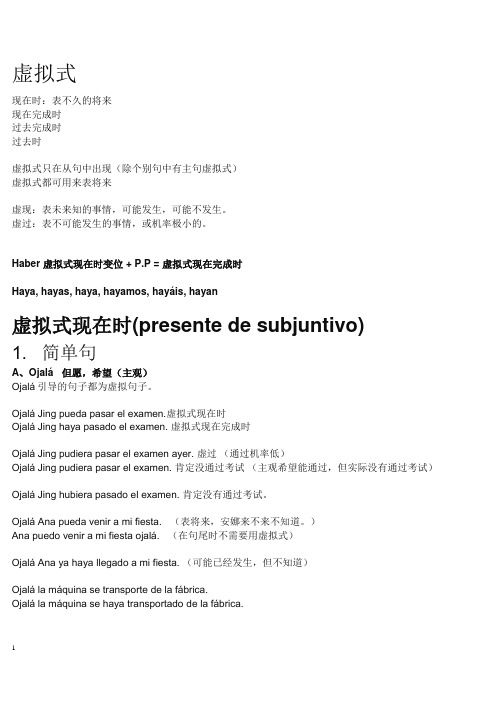
虚拟式现在时:表不久的将来现在完成时过去完成时过去时虚拟式只在从句中出现(除个别句中有主句虚拟式)虚拟式都可用来表将来虚现:表未来知的事情,可能发生,可能不发生。
虚过:表不可能发生的事情,或机率极小的。
Haber 虚拟式现在时变位 + P.P = 虚拟式现在完成时Haya, hayas, haya, hayamos, hayáis, hayan虚拟式现在时(presente de subjuntivo)1. 简单句A、Ojalá但愿,希望(主观)Ojalá引导的句子都为虚拟句子。
Ojalá Jing pueda pasar el examen.虚拟式现在时Ojalá Jing haya pasado el examen. 虚拟式现在完成时Ojalá Jing pudiera pasar el examen ayer. 虚过(通过机率低)Ojalá Jing pudiera pasar el examen. 肯定没通过考试(主观希望能通过,但实际没有通过考试)Ojalá Jing hubiera pasado el examen. 肯定没有通过考试。
Ojalá Ana pueda venir a mi fiesta. (表将来,安娜来不来不知道。
)Ana puedo venir a mi fiesta ojalá. (在句尾时不需要用虚拟式)Ojalá Ana ya haya llegado a mi fiesta. (可能已经发生,但不知道)Ojalá la máquina se transporte de la fábrica.Ojalá la máquina se haya transportado de la fábrica.B、Quizá, quizás (意为:maybe, perhaps后面只加虚现,不加虚过客观A lo mejor 也许,或许(但不用虚拟式句子)Quizá Ana no pueda venir.Quizá Ana haya llegado.C、Que + 虚拟式表:命令或祝福(命令比命令式的语气强硬些,命令式一般是对对方的一个要求或请求)Por favor, tráigame este libro.Que me tráiga este libro.Que tengas mucha suerte.Que tengas un buen viaje.2、虚拟式复合句(现在时)A、目的状语从句parque, para que,a que (不建议使用)A fin que, 表End的意思,目的性的意思De mode que 接陈述式表:所以,因此。
虚拟语气用法梳理

虚拟语气用法梳理虚拟语气是指表达一种假设、愿望、建议、命令、怀疑、推测等非事实情况的语气。
在汉语中,通过词语的选择、语序的改变、虚构语气词等手段来表达虚拟语气。
在英语中,虚拟语气的表达更加规范和明确,有一套独特的语法规则和结构。
一、对过去的虚拟1. 虚拟的动词形式:- 过去式(简单过去时态)常用于表达与过去事实相反的情况,如:I wish I were taller.(我但愿我更高。
)- 过去完成时(had + 过去分词)常用于表示对过去情况的假设,如:If I had studied harder, I would have passed the exam.(如果我当时更努力学习,我就能通过考试。
)- would have + 过去分词用于对过去的事实进行猜测,如:He looks pale as if he would have seen a ghost.(他看起来苍白,好像是看到了鬼。
)2. 虚拟的连接词:- If only(要是...就好了)常用于表达遗憾的气氛,如:If only I had known the truth earlier, I wouldn't have made such a mistake.(要是我早点知道真相,就不会犯这样的错误了。
)- as if / though(好像,仿佛)常用于描述虚构或推测的情况,如:She behaves as if she were the boss.(她的行为好像她是老板。
)二、对现在的虚拟1. 虚拟的动词形式:- 一般现在时(主语+动词原形)与现在事实相反的情况,如:She speaks French as if she were a native speaker.(她说法语就好像是当地人一样。
)- should + 动词原形用于虚拟条件,如:If it should rain, the game would be canceled.(如果下雨的话,比赛将被取消。
虚拟语态的各种用法及练习
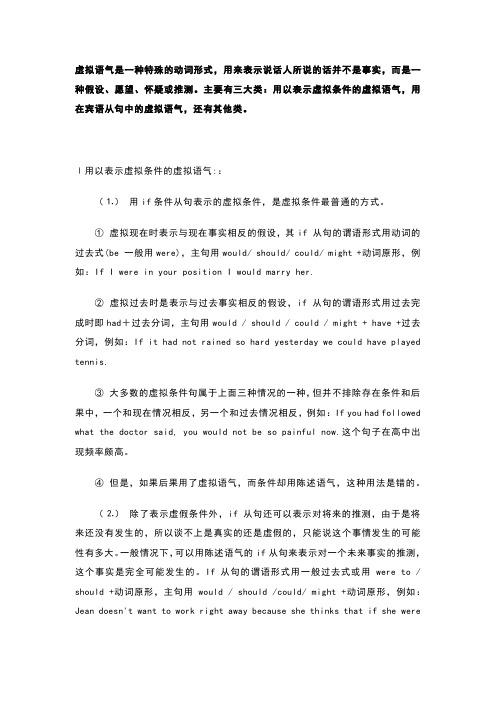
虚拟语气是一种特殊的动词形式,用来表示说话人所说的话并不是事实,而是一种假设、愿望、怀疑或推测。
主要有三大类:用以表示虚拟条件的虚拟语气,用在宾语从句中的虚拟语气,还有其他类。
Ⅰ用以表示虚拟条件的虚拟语气::(⒈)用if条件从句表示的虚拟条件,是虚拟条件最普通的方式。
① 虚拟现在时表示与现在事实相反的假设,其if 从句的谓语形式用动词的过去式(be 一般用were),主句用would/ should/ could/ might +动词原形,例如:If I were in your position I would marry her.② 虚拟过去时是表示与过去事实相反的假设,if 从句的谓语形式用过去完成时即had+过去分词,主句用would / should / could / might + have +过去分词,例如:If it had not rained so hard yesterday we could have played tennis.③ 大多数的虚拟条件句属于上面三种情况的一种,但并不排除存在条件和后果中,一个和现在情况相反,另一个和过去情况相反,例如:If you had followed what the doctor said, you would not be so painful now.这个句子在高中出现频率颇高。
④ 但是,如果后果用了虚拟语气,而条件却用陈述语气,这种用法是错的。
(⒉)除了表示虚假条件外,if从句还可以表示对将来的推测,由于是将来还没有发生的,所以谈不上是真实的还是虚假的,只能说这个事情发生的可能性有多大。
一般情况下,可以用陈述语气的if从句来表示对一个未来事实的推测,这个事实是完全可能发生的。
If从句的谓语形式用一般过去式或用were to / should +动词原形,主句用would / should /could/ might +动词原形,例如:Jean doesn't want to work right away because she thinks that if she wereto get a job she probably wouldn't be able to see her friends very often.(1996年1月四级第44题)(⒊ )有时可以把含有助动词、情态动词、be或have的虚拟条件句中的连词if 省去,而将had , should, were 等词提到主语之前,即用倒装结构,这时候,如果出现not等否定词,否定词需放在主语后面。
虚拟语气的用法与常见句型
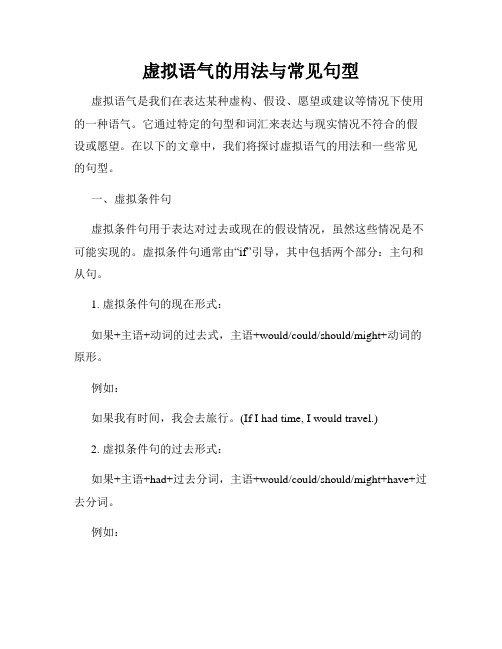
虚拟语气的用法与常见句型虚拟语气是我们在表达某种虚构、假设、愿望或建议等情况下使用的一种语气。
它通过特定的句型和词汇来表达与现实情况不符合的假设或愿望。
在以下的文章中,我们将探讨虚拟语气的用法和一些常见的句型。
一、虚拟条件句虚拟条件句用于表达对过去或现在的假设情况,虽然这些情况是不可能实现的。
虚拟条件句通常由“if”引导,其中包括两个部分:主句和从句。
1. 虚拟条件句的现在形式:如果+主语+动词的过去式,主语+would/could/should/might+动词的原形。
例如:如果我有时间,我会去旅行。
(If I had time, I would travel.)2. 虚拟条件句的过去形式:如果+主语+had+过去分词,主语+would/could/should/might+have+过去分词。
例如:如果我昨天去了那个聚会,我会见到他的。
(If I had gone to the party yesterday, I would have met him.)二、虚拟语气的用途虚拟语气除了用于条件句之外,还可用于表达愿望、建议、命令、让步等情况。
下面是一些常见的虚拟语气句型。
1. 愿望:(a) 现在的愿望:I wish (that) + 主语 + 过去式例如:I wish I were taller. (我希望我更高。
)(b) 过去的愿望:I wished (that) + 主语 + 过去完成时例如:I wished I had studied harder for the exam. (我希望我在考试前更努力学习。
)2. 建议:It is suggested (that) + 主语 + (should) + 动词原形例如:It is suggested that he (should) go on a vacation. (有人建议他去度假。
)3. 命令:It is important/necessary/vital + that + 主语 + (should) + 动词原形例如:It is important that you (should) arrive on time. (重要的是你按时到达。
初中知识点归纳虚拟语气的用法与句型转换
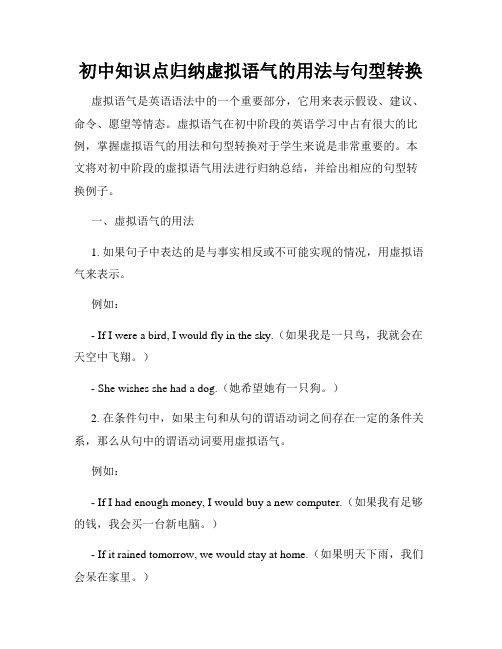
初中知识点归纳虚拟语气的用法与句型转换虚拟语气是英语语法中的一个重要部分,它用来表示假设、建议、命令、愿望等情态。
虚拟语气在初中阶段的英语学习中占有很大的比例,掌握虚拟语气的用法和句型转换对于学生来说是非常重要的。
本文将对初中阶段的虚拟语气用法进行归纳总结,并给出相应的句型转换例子。
一、虚拟语气的用法1. 如果句子中表达的是与事实相反或不可能实现的情况,用虚拟语气来表示。
例如:- If I were a bird, I would fly in the sky.(如果我是一只鸟,我就会在天空中飞翔。
)- She wishes she had a dog.(她希望她有一只狗。
)2. 在条件句中,如果主句和从句的谓语动词之间存在一定的条件关系,那么从句中的谓语动词要用虚拟语气。
例如:- If I had enough money, I would buy a new computer.(如果我有足够的钱,我会买一台新电脑。
)- If it rained tomorrow, we would stay at home.(如果明天下雨,我们会呆在家里。
)3. 在建议、命令、要求等句子中,常用虚拟语气来表达说话人的态度或意愿。
例如:- I suggest that he go to see a doctor.(我建议他去看医生。
)- The teacher insisted that we finish our homework.(老师坚持要我们完成作业。
)4. 在宾语从句中,如果宾语从句中的谓语动词表示一种影响、建议、愿望等,并且与主句谓语动词存在一定的联系,宾语从句中的谓语动词要用虚拟语气。
例如:- I asked him to help me repair the car.(我请他帮我修理汽车。
)- The teacher told us to be quiet in the classroom.(老师告诉我们在教室内要保持安静。
虚拟语气的转换正确转换虚拟语气的句子

虚拟语气的转换正确转换虚拟语气的句子虚拟语气的转换:正确转换虚拟语气的句子虚拟语气是指表示假设、愿望、建议、命令等非真实情况的语法现象。
在中文和英文中,虚拟语气的使用方式和转换方式有所不同。
在本文中,我们将重点探讨英文中虚拟语气的转换问题。
I. 用于表示假设或虚拟的情况在英文中,虚拟语气常常用于表示与事实相反的假设或者不太可能实现的愿望。
在这种情况下,需要将句子中的动词进行转换。
1. 条件句中的转换条件句中的转换主要是将动词从一般现在时转换为过去时,并且加上情态动词"would"。
例如:- If I had more time, I would go on a vacation.(如果我有更多时间,我会去度假。
)- If I were you, I would study harder.(如果我是你,我会更加努力学习。
)2. 表达愿望的转换表达愿望时,将动词的过去式转换为过去完成式,并加上情态动词"would"。
例如:- I wish I had traveled more when I was younger.(我希望年轻时多旅行。
)- She wishes she hadn't eaten so much cake.(她希望自己当时没有吃那么多蛋糕。
)II. 用于表示建议或要求的虚拟语气在英文中,虚拟语气还用于表示建议、要求或命令。
这种情况下,需要对动词进行不同的转换。
1. 表示建议的转换表达建议时,将动词的一般现在时转换为过去时或情态动词"should"。
例如:- He suggested that we go to the park.(他建议我们去公园。
)- The doctor recommended that she should quit smoking.(医生建议她戒烟。
)2. 表示要求或命令的转换表达要求或命令时,将动词的一般现在时转换为过去时或情态动词"would"。
语法实践技巧虚拟语气的转换与替代
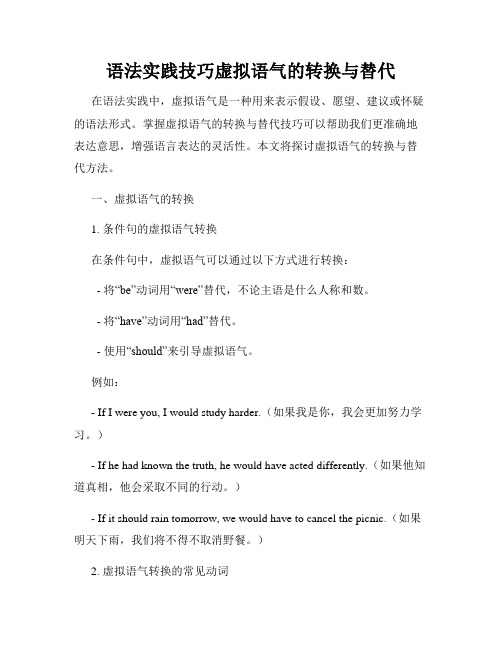
语法实践技巧虚拟语气的转换与替代在语法实践中,虚拟语气是一种用来表示假设、愿望、建议或怀疑的语法形式。
掌握虚拟语气的转换与替代技巧可以帮助我们更准确地表达意思,增强语言表达的灵活性。
本文将探讨虚拟语气的转换与替代方法。
一、虚拟语气的转换1. 条件句的虚拟语气转换在条件句中,虚拟语气可以通过以下方式进行转换:- 将“be”动词用“were”替代,不论主语是什么人称和数。
- 将“have”动词用“had”替代。
- 使用“should”来引导虚拟语气。
例如:- If I were you, I would study harder.(如果我是你,我会更加努力学习。
)- If he had known the truth, he would have acted differently.(如果他知道真相,他会采取不同的行动。
)- If it should rain tomorrow, we would have to cancel the picnic.(如果明天下雨,我们将不得不取消野餐。
)2. 虚拟语气转换的常见动词有些动词在虚拟语气中会发生转换,例如:- “be”动词:be → were。
例如:If I were you, I would apologize.(如果我是你,我会道歉。
)- “come”动词:come → came。
例如:It's time you came home.(是你回家的时候了。
)- “go”动词:go → went。
例如:I wish I went to the party last night.(我希望我昨晚去参加派对了。
)3. 虚拟语气转换的其他情况在一些特定句型中,虚拟语气的转换需要注意:- 在形容词从句中,将“is”或“are”转换为“were”。
例如:He speaks as if he were the boss.(他说话的口气好像他是老板一样。
) - 在名词从句中,将“is”或“are”转换为“were”。
语法实战技巧虚拟语气的转换与替代
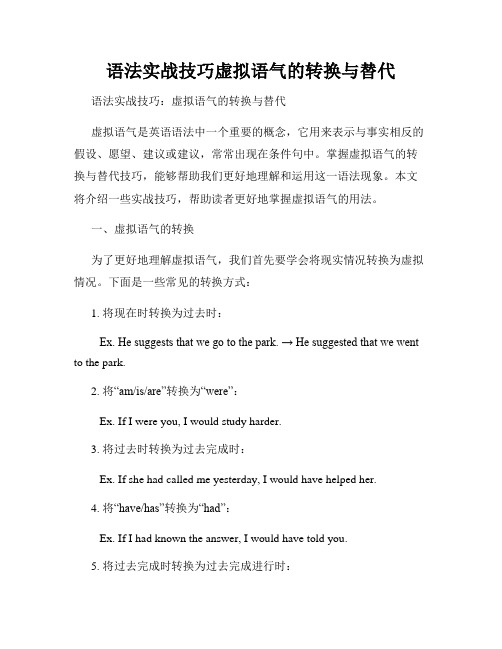
语法实战技巧虚拟语气的转换与替代语法实战技巧:虚拟语气的转换与替代虚拟语气是英语语法中一个重要的概念,它用来表示与事实相反的假设、愿望、建议或建议,常常出现在条件句中。
掌握虚拟语气的转换与替代技巧,能够帮助我们更好地理解和运用这一语法现象。
本文将介绍一些实战技巧,帮助读者更好地掌握虚拟语气的用法。
一、虚拟语气的转换为了更好地理解虚拟语气,我们首先要学会将现实情况转换为虚拟情况。
下面是一些常见的转换方式:1. 将现在时转换为过去时:Ex. He suggests that we go to the park. → He suggested that we went to the park.2. 将“am/is/are”转换为“were”:Ex. If I were you, I would study harder.3. 将过去时转换为过去完成时:Ex. If she had called me yesterday, I would have helped her.4. 将“have/has”转换为“had”:Ex. If I had known the answer, I would have told you.5. 将过去完成时转换为过去完成进行时:Ex. If she had been studying, she would have known the answer.以上是几种常见的虚拟语气转换方式,希望读者能够通过不断练习,熟练掌握这些转换规则。
二、虚拟语气的替代除了转换的方式,我们还可以使用其他的语法结构来表示虚拟情况。
下面是一些常见的虚拟语气替代方式:1. 使用“were to”来表示假设:Ex. If I were to win the lottery, I would travel around the world.2. 使用“should”来表示建议或命令:Ex. The teacher suggested that we should study harder.3. 使用“had better”来表示强烈建议:Ex. You had better leave now, or you will miss the train.4. 使用“wish/if only”来表示对现在或过去情况的遗憾:Ex. I wish I were taller. (对现在的假设)If only I had studied harder. (对过去的假设)通过使用这些替代方式,我们可以更加灵活地运用虚拟语气,使表达更加地道和准确。
虚拟语气的转换学会将虚拟语气转换为陈述语气的句子
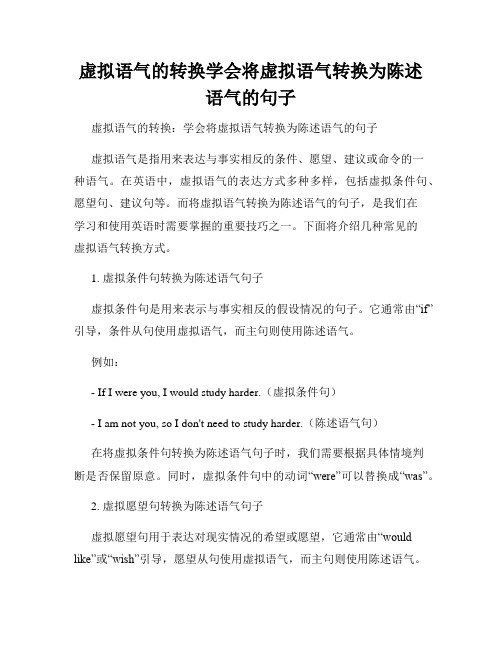
虚拟语气的转换学会将虚拟语气转换为陈述语气的句子虚拟语气的转换:学会将虚拟语气转换为陈述语气的句子虚拟语气是指用来表达与事实相反的条件、愿望、建议或命令的一种语气。
在英语中,虚拟语气的表达方式多种多样,包括虚拟条件句、愿望句、建议句等。
而将虚拟语气转换为陈述语气的句子,是我们在学习和使用英语时需要掌握的重要技巧之一。
下面将介绍几种常见的虚拟语气转换方式。
1. 虚拟条件句转换为陈述语气句子虚拟条件句是用来表示与事实相反的假设情况的句子。
它通常由“if”引导,条件从句使用虚拟语气,而主句则使用陈述语气。
例如:- If I were you, I would study harder.(虚拟条件句)- I am not you, so I don't need to study harder.(陈述语气句)在将虚拟条件句转换为陈述语气句子时,我们需要根据具体情境判断是否保留原意。
同时,虚拟条件句中的动词“were”可以替换成“was”。
2. 虚拟愿望句转换为陈述语气句子虚拟愿望句用于表达对现实情况的希望或愿望,它通常由“would like”或“wish”引导,愿望从句使用虚拟语气,而主句则使用陈述语气。
例如:- I wish I had more free time.(虚拟愿望句)- I don't have more free time.(陈述语气句)在将虚拟愿望句转换为陈述语气句子时,我们需要根据具体情境来确定句子表达的含义,并灵活运用时态和语态的转换。
3. 虚拟建议句转换为陈述语气句子虚拟建议句用于表达建议、要求等,它通常由“should”引导,建议从句使用虚拟语气,而主句则使用陈述语气。
例如:- She suggested that he take a break.(虚拟建议句)- He doesn't need to take a break.(陈述语气句)在将虚拟建议句转换为陈述语气句子时,我们需要根据建议的内容和语气的转换,合理调整句子中的动词形式。
语法中的虚拟条件句省略法与名词性从句的转换
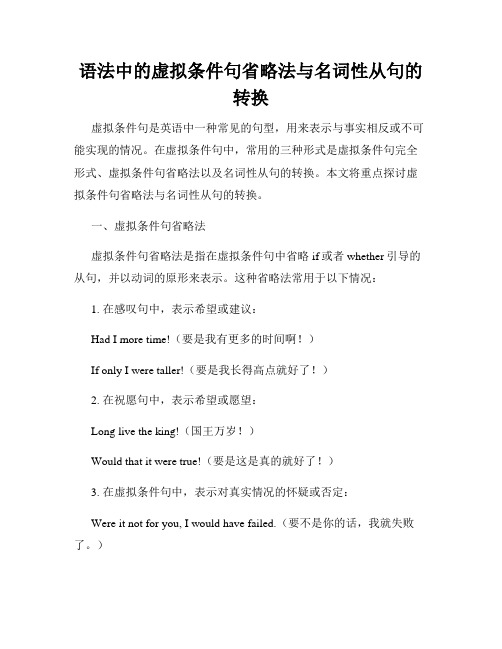
语法中的虚拟条件句省略法与名词性从句的转换虚拟条件句是英语中一种常见的句型,用来表示与事实相反或不可能实现的情况。
在虚拟条件句中,常用的三种形式是虚拟条件句完全形式、虚拟条件句省略法以及名词性从句的转换。
本文将重点探讨虚拟条件句省略法与名词性从句的转换。
一、虚拟条件句省略法虚拟条件句省略法是指在虚拟条件句中省略if或者whether引导的从句,并以动词的原形来表示。
这种省略法常用于以下情况:1. 在感叹句中,表示希望或建议:Had I more time!(要是我有更多的时间啊!)If only I were taller!(要是我长得高点就好了!)2. 在祝愿句中,表示希望或愿望:Long live the king!(国王万岁!)Would that it were true!(要是这是真的就好了!)3. 在虚拟条件句中,表示对真实情况的怀疑或否定:Were it not for you, I would have failed.(要不是你的话,我就失败了。
)Had he listened to me, he wouldn't be in trouble now.(要是他听我的话,他现在就不会有麻烦了。
)虚拟条件句的省略法给句子带来了简洁明了的特点,并且在表达情感和意愿时十分常用。
二、名词性从句的转换名词性从句在句中担任名词的功能,可以作主语、宾语、表语等。
虚拟条件句可以转换为名词性从句的形式,以增加句子的种类与表达方式。
1. 名词性从句(作主语)替代虚拟条件句:That she arrived late caused the delay.(她迟到导致了延误。
)It is essential that we be prepared for any situation.(我们必须为任何情况做好准备。
)2. 名词性从句(作宾语)替代虚拟条件句:I doubt whether he can pass the test.(我怀疑他是否能通过这次考试。
高中语法突破虚拟语气的几种常见形式与应用
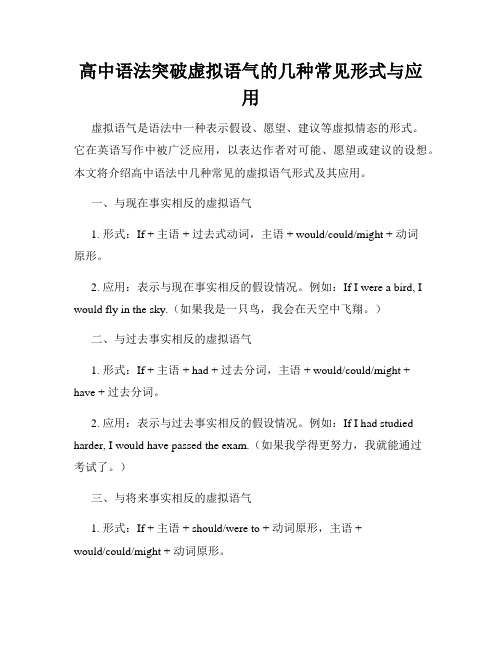
高中语法突破虚拟语气的几种常见形式与应用虚拟语气是语法中一种表示假设、愿望、建议等虚拟情态的形式。
它在英语写作中被广泛应用,以表达作者对可能、愿望或建议的设想。
本文将介绍高中语法中几种常见的虚拟语气形式及其应用。
一、与现在事实相反的虚拟语气1. 形式:If + 主语 + 过去式动词,主语 + would/could/might + 动词原形。
2. 应用:表示与现在事实相反的假设情况。
例如:If I were a bird, I would fly in the sky.(如果我是一只鸟,我会在天空中飞翔。
)二、与过去事实相反的虚拟语气1. 形式:If + 主语 + had + 过去分词,主语 + would/could/might + have + 过去分词。
2. 应用:表示与过去事实相反的假设情况。
例如:If I had studied harder, I would have passed the exam.(如果我学得更努力,我就能通过考试了。
)三、与将来事实相反的虚拟语气1. 形式:If + 主语 + should/were to + 动词原形,主语 +would/could/might + 动词原形。
2. 应用:表示与将来事实相反的假设情况。
例如:If it should rain tomorrow, we would stay at home.(如果明天下雨了,我们就呆在家里。
)四、与现在虚拟条件相反的虚拟语气1. 形式:If + 主语 + 动词原形,主语 + 过去式动词/过去完成式/should/were to + 动词原形。
2. 应用:表示对当前虚拟条件的否定。
例如:If he were not so lazy, he would pass the test.(如果他不那么懒,他就能通过考试了。
)五、与过去虚拟条件相反的虚拟语气1. 形式:If + 主语 + had + 过去分词,主语 + wouldn't/couldn't/might not + have + 过去分词。
- 1、下载文档前请自行甄别文档内容的完整性,平台不提供额外的编辑、内容补充、找答案等附加服务。
- 2、"仅部分预览"的文档,不可在线预览部分如存在完整性等问题,可反馈申请退款(可完整预览的文档不适用该条件!)。
- 3、如文档侵犯您的权益,请联系客服反馈,我们会尽快为您处理(人工客服工作时间:9:00-18:30)。
将下列句子改成间接引语
1.Er fragte sie: …Wann fahren Sie nach Berlin? “
2.Er fragte mich: …Was wollen Sie essen? “
3.Sie fragte ihn: …Warum haben Sie das getan?“
4.sie fragte ihn: …Wer war bei Ihnen?“
5.Sie sagte zu ihrem Mann: …Trink nicht so viel! “
6.Frau Schumacher bat ihren Freund : …Bitte hilf mir.“
7.Er riet ihr: …Überlege es dir noch mal! “
8.Er sagte zu ihr: …Schreib mir bitte eine Postkarte!“
Er bat sie, ...
9.Mein Freund sagte mir: …Erkundige dir doch mal im Reisebüro!“
Mein Freund reit mir, ...
10.Der Lehrer fragte: …Haben Sie es verstanden? “
把下列句子改成非现实的条件句
1.Ohne Wörterbuch lässt sich der Artikel nur schwer übersetzen.
2.Weil er vorsichtig gefahren ist, konnte er gerade noch bremsen.
3.Mit dem Bus dauert die Fahrt sehr lange.
Mit dem Taxi...
4.Er hat den Vorschlag abgelehnt.
An seiner Stelle...
5.Sie konnten die Grenze nicht passieren, weil ihr Paß abgelaufen ist.
6.Du gabst du zu viel Geld für Zigaretten aus. Deshalb konntest du dir einen neuen
Computer nicht leisten.
Ergänzen Sie.
1.Ich ___________mich freuen, Sie bald wiederzusehen.
2.Es ____________ schön, wenn Sie auch kommen ____________.
3.Wenn es dir doch bald besser ____________!
4.Wenn wir doch länger geblieben ____________ !
5.Wenn er Zeit gehabt ____________, ____________ er nach München
gefahren.
6.____________ Sie bitte die Tür schließen?
7.____________ Sie vielleicht ein Glas Wasser?
8.Ich ____________ den Film noch einmal an, wenn er mir ____________ .
9.Wenn er doch besser ____________ (schreiben, sprechen)!
10.______ es keinen Krieg, dann ______ die Menschen glücklich.
11.Wenn er eine Brille ____________, brauchte er seine Augen nicht so
anzustrengen.
12.____________ dieser Termin für Sie in Frage?
13.Er tut so, als ob er uns nicht ____________ (verstehen, kennen)
14.____________ er besser aufgepasst, ____________ das nicht passiert.
15.Es ____________ mir lieber, auf dem Land zu leben.。
